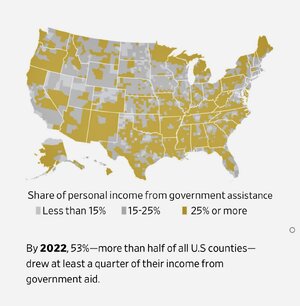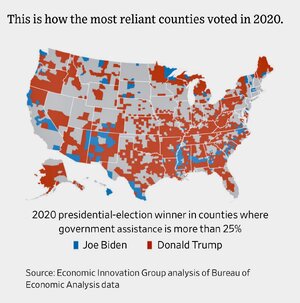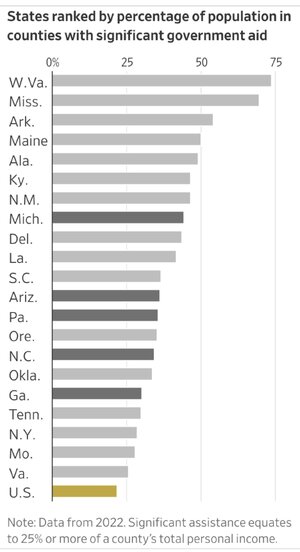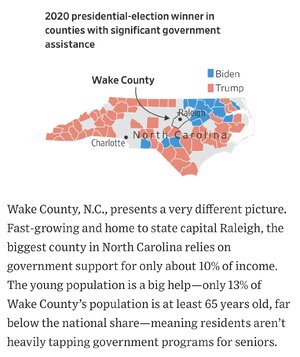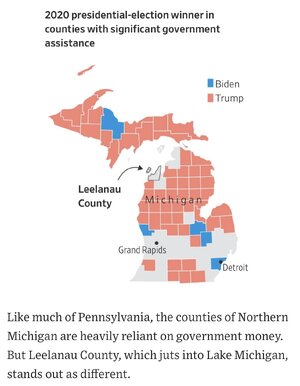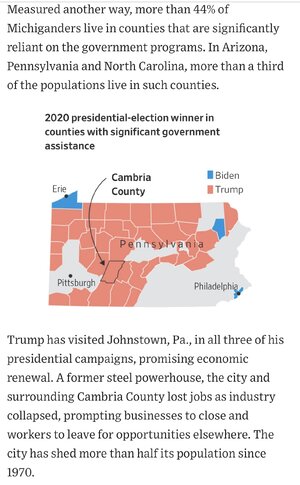Navigation
Install the app
How to install the app on iOS
Follow along with the video below to see how to install our site as a web app on your home screen.
Note: This feature may not be available in some browsers.
More options
You are using an out of date browser. It may not display this or other websites correctly.
You should upgrade or use an alternative browser.
You should upgrade or use an alternative browser.
Over half of US counties residents rely on gov’t assistance for at least 25% of income; guess how they vote?
- Thread starter nycfan
- Start date
- Replies: 42
- Views: 842
- Politics
BillOfRights
Honored Member
- Messages
- 833
"I never thought the leopards would eat MY face" sobs the woman who voted for the Leopards Eating People's Faces Party.
BillOfRights
Honored Member
- Messages
- 833
It's easy to assume many of the people who depend on federal assistance vote for the party that wants to cut that assistance, and I'll make that same assumption that there's probably a lot of that, but many people in these areas who aren't on government assistance vote for the party that will cut that assistance because they see themselves as makers and so many of these people as takers, and they resent them. While these cuts would be disastrous for many of the people receiving the assistance, it would also be detrimental to the economies of these areas, but I get the feeling many of the "makers" would happily accept less overall economic growth if their personal income went up.
BubbaOtis
Exceptional Member
- Messages
- 205
I'd be interested in seeing the data excluding Social Security and Medicare. Including those entitlement as "government assistance" means any area with a lot of oldsters gets boosted in the rankings. I haven't heard either party campaign on cutting entitlements and I doubt the recipients view themselves as being on government assistance as much as receiving benefits they've paid for throughout their working careers.
- Messages
- 2,850
Candidates may not campaign on cutting Social Security and Medicare, but those who campaign on “balancing the budget” and “fiscal responsibility” are doing precisely that.I'd be interested in seeing the data excluding Social Security and Medicare. Including those entitlement as "government assistance" means any area with a lot of oldsters gets boosted in the rankings. I haven't heard either party campaign on cutting entitlements and I doubt the recipients view themselves as being on government assistance as much as receiving benefits they've paid for throughout their working careers.
- Messages
- 5,725
What happened to their boot straps?
I thought they preached less government?
- Messages
- 5,725
I believe all of them see themselves as makers.It's easy to assume many of the people who depend on federal assistance vote for the party that wants to cut that assistance, and I'll make that same assumption that there's probably a lot of that, but many people in these areas who aren't on government assistance vote for the party that will cut that assistance because they see themselves as makers and so many of these people as takers, and they resent them. While these cuts would be disastrous for many of the people receiving the assistance, it would also be detrimental to the economies of these areas, but I get the feeling many of the "makers" would happily accept less overall economic growth if their personal income went up.
The right is very short sighted regarding how the government helps the overall welfare and economy.
I recall, when I was conservative, an idea to get the government out of transportation and make all roads toll roads. Just imagine that actually happening and the impact on the poorest people and the economy.
People need to understand where the government money is spent and how it helps people and society in general.
- Messages
- 5,725
No one talks about it because it isn't popular, but many in the government want to cut entitlements, just look at the proposed budgets over the past 8 years.I'd be interested in seeing the data excluding Social Security and Medicare. Including those entitlement as "government assistance" means any area with a lot of oldsters gets boosted in the rankings. I haven't heard either party campaign on cutting entitlements and I doubt the recipients view themselves as being on government assistance as much as receiving benefits they've paid for throughout their working careers.
gtyellowjacket
Iconic Member
- Messages
- 2,038
This is probably the answer. I suspect that statewide it would still be similar but you would see more Urban counties and therefore more blue counties making the list.I'd be interested in seeing the data excluding Social Security and Medicare. Including those entitlement as "government assistance" means any area with a lot of oldsters gets boosted in the rankings. I haven't heard either party campaign on cutting entitlements and I doubt the recipients view themselves as being on government assistance as much as receiving benefits they've paid for throughout their working careers.
Surprised that there are that many blue counties Northeast of Raleigh. Not sure how they can gerrymander that. I know Eastern North Carolina used to be a big Democratic stronghold but don't know why the southeast flipped and the Northeast stayed.
BillOfRights
Honored Member
- Messages
- 833
The 2025 Presidential Transition Project that was written by more that two dozen trump administration officials proposes changes to Social Security that would reduce benefits for most people.I'd be interested in seeing the data excluding Social Security and Medicare. Including those entitlement as "government assistance" means any area with a lot of oldsters gets boosted in the rankings. I haven't heard either party campaign on cutting entitlements and I doubt the recipients view themselves as being on government assistance as much as receiving benefits they've paid for throughout their working careers.
What Ex-Trump Officials’ Project 2025 Means for Your Social Security
Even if you're only the most casual news watcher, odds are, you've heard of Project 2025. This 922-plus page document, organized by The Heritage Foundation -- a well-known conservative think tank --...
The same document proposes moving Medicare away from traditional Medicare to private-sector plans and reducing the regulations that govern them. That's great news if you happen to be an insurance company, but not so great if you are a person. It also proposes changes that would increase prescription drug costs for seniors and huge cuts to Medicaid.
What Ex-Trump Officials’ Project 2025 Means for Your Social Security
Even if you're only the most casual news watcher, odds are, you've heard of Project 2025. This 922-plus page document, organized by The Heritage Foundation -- a well-known conservative think tank --...
It's no wonder that the party proposing these cuts doesn't want to talk about them.
Not sure about the northern counties but,This is probably the answer. I suspect that statewide it would still be similar but you would see more Urban counties and therefore more blue counties making the list.
Surprised that there are that many blue counties Northeast of Raleigh. Not sure how they can gerrymander that. I know Eastern North Carolina used to be a big Democratic stronghold but don't know why the southeast flipped and the Northeast stayed.
A brilliant political analyst, Johnson foresaw the consequences of his civil rights legislation on the day he signed it into law. He is said to have remarked: “We’ve lost the south for a generation.”
- Messages
- 2,850
Is this a joke?I know Eastern North Carolina used to be a big Democratic stronghold but don't know why the southeast flipped and the Northeast stayed.
rodoheel
Iconic Member
- Messages
- 1,882
Most of these are rural counties. I would be willing to bet if you asked most of those "makers" who they resent for taking government assistance the majority would identify urban populations (and maybe specifically urban minorities) not the people around them in their rural counties.It's easy to assume many of the people who depend on federal assistance vote for the party that wants to cut that assistance, and I'll make that same assumption that there's probably a lot of that, but many people in these areas who aren't on government assistance vote for the party that will cut that assistance because they see themselves as makers and so many of these people as takers, and they resent them. While these cuts would be disastrous for many of the people receiving the assistance, it would also be detrimental to the economies of these areas, but I get the feeling many of the "makers" would happily accept less overall economic growth if their personal income went up.
BillOfRights
Honored Member
- Messages
- 833
Roads are a great example of a socialist policy in the US that is very popular. Roads in rural areas often cost more to build and serve fewer people. I suspect that most of the highest-cost-per-mile-traveled roads are in rural areas for the benefit of people who oppose government spending and socialism.I believe all of them see themselves as makers.
The right is very short sighted regarding how the government helps the overall welfare and economy.
I recall, when I was conservative, an idea to get the government out of transportation and make all roads toll roads. Just imagine that actually happening and the impact on the poorest people and the economy.
People need to understand where the government money is spent and how it helps people and society in general.
- Messages
- 1,272
Drive around Eastern North Carolina and marvel at all the non-interstate four lane highways built to make sure all those hog and turkey trucks can roll unimpeded to the processing plants.Roads are a great example of a socialist policy in the US that is very popular. Roads in rural areas often cost more to build and serve fewer people. I suspect that most of the highest-cost-per-mile-traveled roads are in rural areas for the benefit of people who oppose government spending and socialism.
ZenMode
Inconceivable Member
- Messages
- 3,746
I don't subscribe to the WSJ, so I can't see the details. Does the article clarify what is meant by "Federal and State support"? In the past, articles have included federal funding for military facilities, which clearly isn't among the items that people are, or should be, concerned about.
BillOfRights
Honored Member
- Messages
- 833
Social Security Disability by county
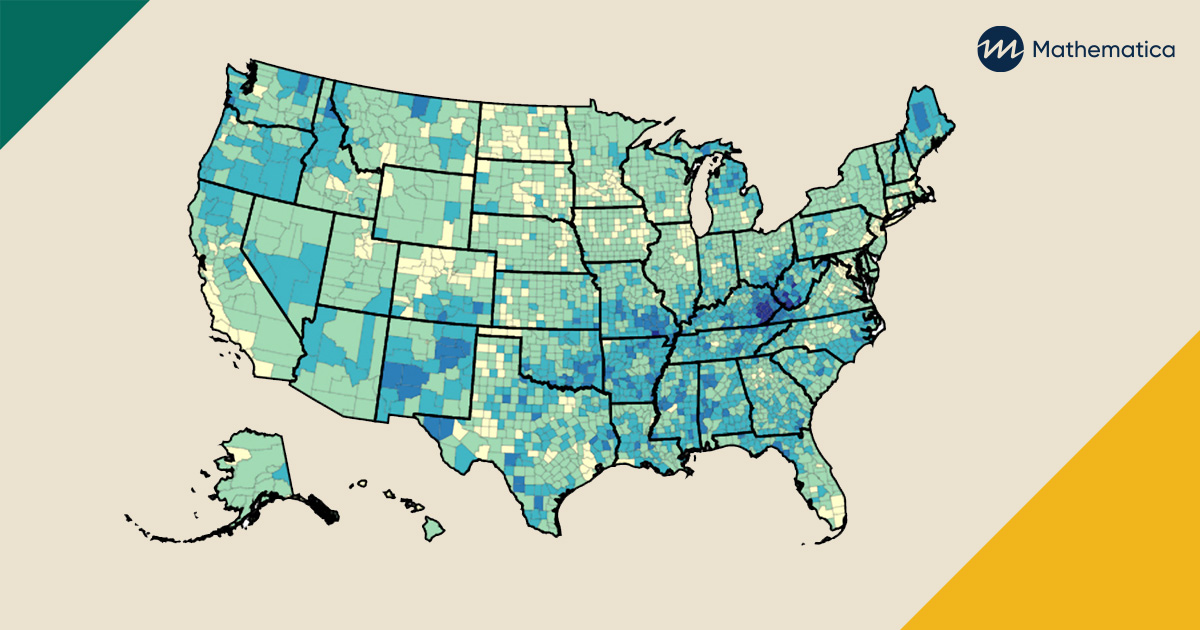
 www.mathematica.org
www.mathematica.org

State Disability Maps
With these maps, Mathematica helps decision makers uncover valuable insights about the prevalence of disability and use of disability benefits in different communities.
Share:

